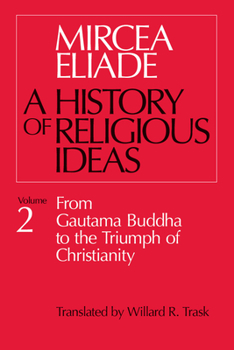History of Religious Ideas, Volume 2: From Gautama Buddha to the Triumph of Christianity
(Book #2 in the Histoire des croyances et des idées religieuses Series)
In volume 2 of this monumental work, Mircea Eliade continues his magisterial progress through the history of religious ideas. The religions of ancient China, Brahmanism and Hinduism, Buddha and his contemporaries, Roman religion, Celtic and German religions, Judaism, the Hellenistic period, the Iranian syntheses, and the birth of Christianity--all are encompassed in this volume.
Format:Paperback
Language:English
ISBN:0226204030
ISBN13:9780226204031
Release Date:January 1985
Publisher:University of Chicago Press
Length:580 Pages
Weight:1.76 lbs.
Dimensions:1.4" x 5.9" x 9.0"
Customer Reviews
5 ratings
Superb
Published by Thriftbooks.com User , 15 years ago
Mircea Eliade was a genius, a polymath, and his three-volume history of religious ideas deserves to go on your bookshelf right next to Copleston's history of philosophy. I want this review to be brief, so I'll just point out that Page One is really worth the price of the entire book. On that page, Eliade simply reprints his earlier thoughts on religion in general, which strike me as absolutely true: around the world and throughout recorded time, we human beings have been religious. And this is something which really deserves serious thought and examination. I myself am about as religious as a pea, but I cannot help noticing that I am in a distinct minority. Then I look at Page One again, and think again about Eliade's statement that religion is a constant of human consciousness, NOT an historical stage which we have passed through. Well, the man who most fervently believed that religion was "only a phase" was Mr. Karl Marx, who nowadays looks to have been proven wrong about almost everything. As Eliade says, "it is difficult to imagine how the human mind could function without the conviction that there is something irreducibly *real* in the world; and it is impossible to imagine how consciousness could appear without conferring a *meaning* on man's impulses and experiences. Consciousness of a real and meaningful world is intimately connected with the discovery of the sacred.....Living, considered as being human, is in itself a *religious act*, for food-getting, sexual life, and work have a sacramental value. In other words, to be --- or, rather, to become --- *a man* signifies being 'religious.' " This might well be compared with Larkin's poem, "Church Going." Perhaps the question for us non-believers is not so much to "convert" others, as to try to define a religion that works for everyone. Just as an example, I cannot see any reason why a religious life should involve a conflict with science, or an easily-falsifiable belief that the Earth was created in 4,000 BC.
Sourcebook on religion.
Published by Thriftbooks.com User , 19 years ago
An excellent source of information about early development of religion. It shows the evolution of human thought with respect to metaphysical matters.
The human and the spiritual
Published by Thriftbooks.com User , 20 years ago
Mircea Eliade has spent a lifetime exploring the origins, meaning and mysteries of mankind's spiritual inner being. He is the Joseph Campbell of religion - not myth. This first volume was ably translated (from the French) into clear and direct English - a hallmark of his writing. It is difficult to speak knowingly of neolithic religion because the evidence is largely circumstantial and evolutionary. That is, we divine from our own religious present what must have existed prior to the forming of current ideas.One of his main points is that peoples around the world, for whatever reason, seemed to be instinctually drawn toward the worship of something - an object, animal, human or unseen god or goddess. In this first volume he explores various cultures and their beliefs - the Mayas, Greeks, Iranians, neolithic man, Egypt, other Middle East groups...a dazzling array of cultures and societies. As the imagination grew, so did belief in an unseen world.Of particular interest is the section on ancient Israeli beliefs and the origins of Yahweh. The chapters on religion in Greece were notable for their abundant detail. Even in the most isolated areas, the same rites and beliefs emerged - the idea of sacrifice, the belief in another life, the battle of good vs evil, the idea of holy representatives and eventually the thought of eternal life.
Wonderful
Published by Thriftbooks.com User , 23 years ago
This is a superb series on the history of religion, and incidentally serves as a fine introduction to comparative religion. The only real weakness is in this first volume: I've never like the treatment of paleolithic religion here, which seems abrupt. But this caveat is far too minor to dissuade anyone from reading these wonderful books.
Tour De Force on History of Religious Ideas
Published by Thriftbooks.com User , 23 years ago
Volumes 1 -3 were recommended to me by John Pamperin who studied theology at University of Chicago. John's one of brightest individuals that I know. This is a great treatment on religion and it is a bit of effort to read through volumes 1-3 but well worth the journey! Much more deep and thorough than Joseph Cambell's works! Thanks John!





